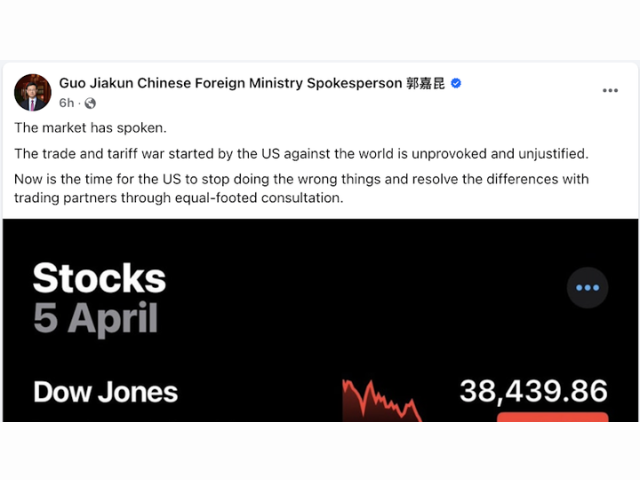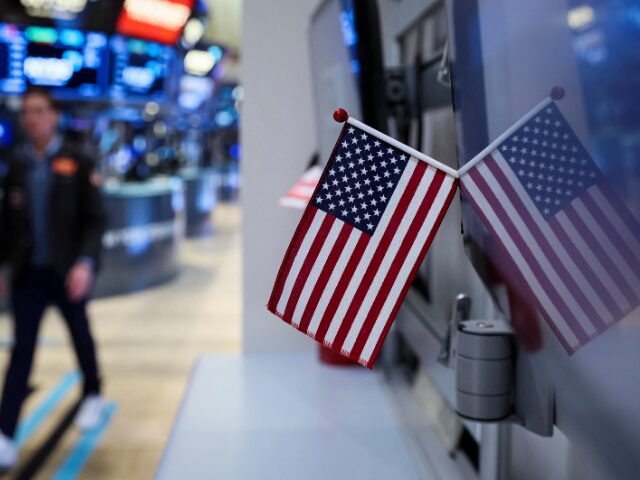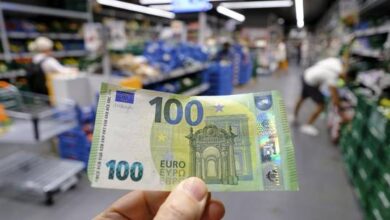Global financial markets lost $5 trillion in value this week after US President Donald Trump imposed sweeping new tariffs on Chinese goods, drawing retaliation from Beijing and rattling economies worldwide.
On Friday, Trump raised levies on Chinese imports by 34%, bringing total US tariffs on Chinese goods to 54% this year. The move also ended a duty-free allowance for low-value imports from China and introduced a new 10% “baseline” tariff on all global imports, with higher rates set to follow next week.
China responded immediately with equivalent tariffs and export controls on key materials, including rare earths.
Chinese foreign ministry spokesperson Guo Jiakun wrote on Facebook, “The market has spoken,” sharing an image of plummeting US markets and calling for “equal-footed consultation.”
 The fallout was swift. The S&P 500 dropped 9% over the week, marking its worst decline since the pandemic, while oil and commodity prices tumbled and investors flocked to government bonds for safety.
The fallout was swift. The S&P 500 dropped 9% over the week, marking its worst decline since the pandemic, while oil and commodity prices tumbled and investors flocked to government bonds for safety.
US Customs began collecting the new 10% tariffs from midnight Saturday, with no grace period for new cargo, although shipments already en route by sea or air have until May 27 to arrive tariff-free.
Higher “reciprocal” tariffs of up to 50% will take effect next week, hitting EU imports with 20% duties and Chinese goods with 34%. Vietnam, also affected, has agreed to trade talks.
Canada and Mexico were excluded from the latest round due to ongoing levies related to US fentanyl policy, while over 1,000 categories—mainly in energy, pharmaceuticals, and semiconductors—were exempted.
“This is the single biggest trade action of our lifetime,” said Kelly Ann Shaw, a former White House trade adviser. “It’s a seismic shift in how we trade with the world.”
Industries warn of inflation, job losses
Chinese trade bodies across sectors warned of knock-on effects for both countries, with the chemicals and metals industry predicting increased US inflation and recession risk.
France’s cognac industry, which exports $1.1 billion annually to the US, is already seeing economic fallout. Following new 20% tariffs imposed by Washington, producers like Jean Fillioux are uprooting vineyards and searching for new markets.
“Problems are part of a vintner’s life,” said Christophe Fillioux, whose family has produced cognac for over 130 years. “But the visibility now is near zero.”
Trump has threatened to raise wine and spirits tariffs to 200% if Europe responds with new duties on US bourbon.
Global slowdown adds pressure
Trade tensions come as the cognac sector faces declining global demand after years of expansion. Growers who invested heavily post-COVID now face mounting debts.
“We’re managing this with the banks,” said Florent Morillon of the Bureau National Interprofessionnel du Cognac. “External shocks are forcing a complete rethink.”
As Washington and Beijing dig in, economists warn the tariff war could strain global growth and push vulnerable industries over the edge. China, meanwhile, is calling on the US to return to dialogue and abandon what it called “wrong actions.”







